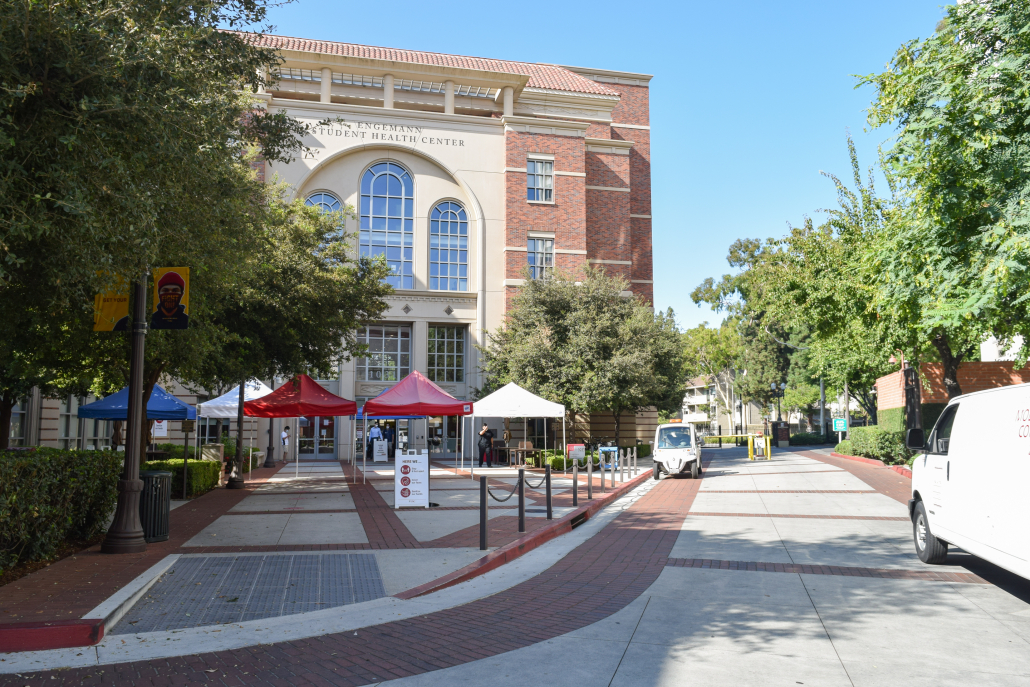Zero monkeypox cases reported in two weeks on USC campuses

This article contains brief discussions of mental health.
In a briefing Tuesday with the Daily Trojan, Chief Student Health Officer Dr. Sarah Van Orman confirmed that there have been no new reported monkeypox cases in the last two weeks.
“We did have a handful of cases at the end of August, beginning of September,” Van Orman said, “but nothing recently; and we’re seeing that across [Los Angeles County] that cases are actually plateauing and maybe even declining.”
While Van Orman did not provide specific numbers — she said in a briefing Sept. 6 that Student Health would not publicize such data — the statement is consistent with national trends as reported by the Centers for Disease Prevention and Control, which delineate a continued decline after peaking Aug. 22 at 916 new cases.
As the monkeypox outbreak dwindles, vaccine supplies are also improving and thus more widely accessible: USC Pharmacies opened its own site Sept. 17 near Dodger Stadium, where it administers immunizations against monkeypox, influenza and coronavirus at no cost.
Van Orman said the University is also “actively evaluating” potential administration of monkeypox vaccines on campus. In the meantime, Van Orman encouraged people to get vaccinated at other sites.
“There’s lots of other community vaccine sites where people can just walk in and get their first dose, or if they’ve gotten their first dose, their second dose,” she said. “We really encourage people to be vaccinated if they fall into one of the risk groups and they have not yet been vaccinated.”
Van Orman reported 113 new coronavirus cases for the week beginning Sept. 18 — including positive tests at Student Health and at-home tests — a decrease of 18.7% compared to the 139 reported cases from the week prior. Trends at USC continue to follow that of L.A. County, where the seven-day case rate according to the CDC fell to 108.62 on Monday, a 16.8% decrease from the previous week.
“We’re just reminding people: this is a great time to get your [coronavirus] booster and your flu shot, so that we can continue good health for the semester,” Van Orman said, noting that Student Health plans to open booster and flu shot clinics at a date yet to be announced.
With midterm season on the horizon and yet another heat wave baking Southern California, Van Orman discussed coping strategies for each. The most important self-care strategy ahead of exams, she said, is sleep.
“We can talk about exercise and relaxation and eating well, but none of it matters if you’re not sleeping,” Van Orman said. “What we find that a lot of people do, with the cyclic nature of school, is to not sleep a little for several nights and then sleep a lot; and that really is very bad for our mental health. It actually affects our cognitive function: people perform better, including academically, when they get regular sleep.”
Van Orman advised against excessive napping, warning it could disrupt “nighttime sleep patterns and lead to insomnia.”
“That’s a very common pattern we see with people: you get up early, you go to class, you come back, you sleep all afternoon, and then you wake up and work late into the night,” Van Orman said. “And that is something that can really impact people’s mental health.”
Student Health offers the Sleep Well Workshop, a workshop on sleep hygiene, available through the MySHR portal.
Other self-care strategies, according to Van Orman, include staying physically active, eating regularly, utilizing available resources for feelings of overwhelming or paralyzing anxiety and seeking professional help — including through the 24/7 USC Student Health line at (213) 740-WELL (9355) — if experiencing thoughts of self-harm or suicide.
Effects on health can be further compounded by the new heat advisory issued throughout Southern California. Though less severe than the last wave early September, Van Orman warned that heat stroke and heat exhaustion are still possible.
While heat stroke is a medical emergency caused by “acute overheating in the moment,” heat exhaustion is gradual and can build over several days, Van Orman said.
“After day two or day three … they may just start feeling a little fatigue, they might be feeling nauseous — just not feeling well,” she said. “The best way to counteract that is making sure they’re staying extremely well-hydrated, really increasing their fluid intake, and then making sure that … they are spending some hours indoors.”

